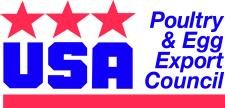 The weekly MondayLine distributed by the USA Poultry and Egg Export Council documented promotional programs in nations importing U.S. shell eggs and derived products. Programs are organized by local offices staffed by USAPEEC personnel with the assistance of in-country FAS attaches and academics. In a recent program, the Egg and Egg Products Training Program was presented in Mexico City, sponsored by the Illinois Soybean Association. The objective was to provide industry professionals in Mexico with knowledge of U.S. eggs and egg products with the anticipation that U.S. producers will derive a benefit. The prestige of the training program is evidenced by the participation of the National Autonomous University of Mexico that endorsed diplomas distributed to those who successfully completed the training programs that included both Zoom and in-person instruction.
The weekly MondayLine distributed by the USA Poultry and Egg Export Council documented promotional programs in nations importing U.S. shell eggs and derived products. Programs are organized by local offices staffed by USAPEEC personnel with the assistance of in-country FAS attaches and academics. In a recent program, the Egg and Egg Products Training Program was presented in Mexico City, sponsored by the Illinois Soybean Association. The objective was to provide industry professionals in Mexico with knowledge of U.S. eggs and egg products with the anticipation that U.S. producers will derive a benefit. The prestige of the training program is evidenced by the participation of the National Autonomous University of Mexico that endorsed diplomas distributed to those who successfully completed the training programs that included both Zoom and in-person instruction.
 A participant in the most recent program employed by a major egg processing company stated, “We were provided with great information that we will be sharing with our sales team and in communication with our clients and consumers.”
A participant in the most recent program employed by a major egg processing company stated, “We were provided with great information that we will be sharing with our sales team and in communication with our clients and consumers.”
It is a matter of record that Mexico is lagging in imports of shell eggs and liquids as reported in the monthly reviews of exports that can be retrieved by entering “export” in the SEARCH block of EGG-NEWS. For the first half of 2022, shell eggs exports to Mexico were down 11 percent in volume to 316,569 million dozen and value was down by 10 percent to $384 million compared to the corresponding first half of 2021. With respect to egg products, Mexico was ranked fifth as an importer during the first half of 2022 with imports of 999 metric tons, down 71 percent from 2021 and with a value of $3.8 million down 47 percent.
It would be appropriate for USAPEEC to evaluate the impact of educational programs on decisions to purchase U.S. shell eggs and egg products in preference to commodities produced domestically or offered by other exporters. It is also important to determine the motivational factors to preferentially purchase U.S. eggs and egg products including cost, quality and reliability as a supplier. Reports on educational and promotional programs make for good domestic acceptance but their impact on volumes imported and value of trade has yet to be quantified.